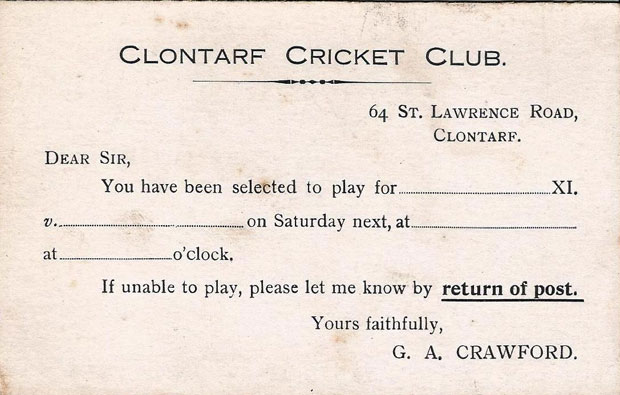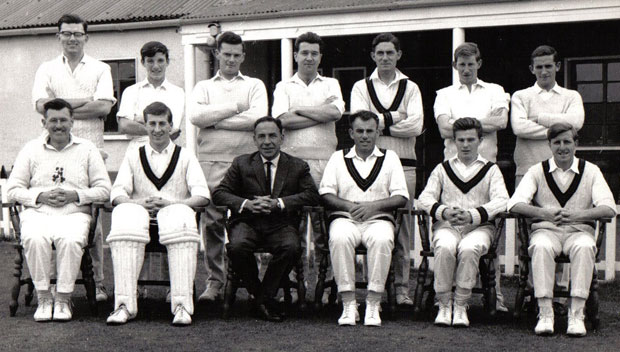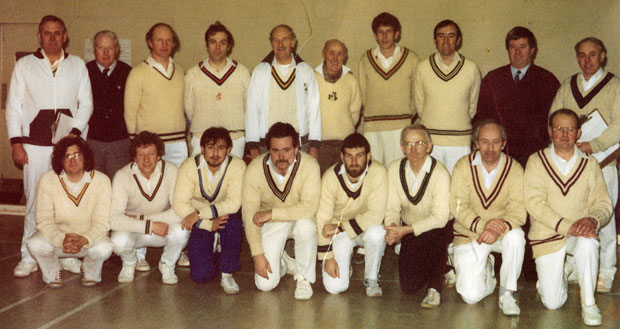During the first lockdown, remember that? Barry Chambers suggested a series of articles recognising those who contribute so much to our game from Beyond the Boundary.
The series was very well received and acknowledged many cricket people whose greatest work took place in the background, often unseen. At that time, I considered someone who I felt deserved recognition but having begun to sketch out a draft, I felt I could not do justice to this person such was the full life he has led.
Then soon after he had celebrated his 93rd birthday in July, I met his son who was umpiring a final at which I was taking some photographs and the idea was resurrected. It has taken a while to actually get around putting pen to paper, a combination of a temporary return to normal life and a genuine fear of missing out on something in the extraordinary story of Vincent Francis Savino, for it is impossible to tell his cricket tale without the other aspects of his life impinging.
Let us start with the name. In 1898 a young Italian, from just outside Rome, by the name of Giuseppe Savino was enroute to America when his ship stopped at Cork. There he met Maria Gassparro and rather than get back on board he opted to stay. Giuseppe was Vinny’s grandfather and he and Maria moved to the Aungier Street area of Dublin and set up shop. The Savinos had arrived.
Vinny’s father, Frank, an official in the Ministry of Defence (and like his father a talented violin player) moved to Glasnevin, a new suburb in North Dublin where Vinny spent his early life. Sport became a huge part of his life from an early age. Whether Gaelic football, soccer, rugby, athletics or boxing, it didn’t bother Vinny.
Gaelic football was the game at which initially he excelled, with his school team O’Connell’s and then as part of the Dublin minor team which won the 1945 All Ireland title, beating Leitrim 4-7 to 0-4. As the team’s goalkeeper, the zero goals must have felt good. The Dublin side included another cricketer Denis Mahony, who played youth cricket at Cremore CC before a stellar football career for Dublin and Ollie Freaney who also was a player who graduated to the Senior side. It would be 1983 before another Clontarf cricketer won an All Ireland medal, when Alan McClean emulated the man with whom he shared a dressing room in the early 80s.

His introduction to cricket had arrived in the early 1940s when on family holiday in Rush he had come across the old Rush CC ground and would spend his holiday watching and later playing on the junior sides of that club.
After school in 1945, Vinny joined the Defence Forces as a cadet. He remained in the Forces all his career and it became a huge part of the person we now know. His initial posting was to the Southern Battalion in Cork. This posting left a huge impression on the young cadet, as in the ranks was a number of former British Army members, just returned from the Second World War. These soldiers introduced sport into the warm up exercises in the Battalion, boxing, athletics, basketball, volleyball (he would later become the first Chairman of the Irish Volleyball Association) which all became part of the daily routine, providing not just the physical outlet but all instilling the team work necessary in the job. Vinny was sold on this idea immediately.
While in Cork, he played rugby for Dolphin, while also representing the Barracks in soccer. During the summer months, he organised some cricket matches for the Southern Command against local sides. Back in Dublin he joined Wanderers FC a club he not just played for but also was President in 1984/85. As full back he was noted as a fine goal kicker and a “tenacious tackler”.
He also joined Clontarf Cricket Club in the early 50s, the club which became his home club, as a player and again as President in due course. He made his senior debut in 1953 against Leinster in June of that year. The 1950s were an interesting period in the Clontarf history. Having won the Senior Cup in 1950 it seemed like a golden era beckoned for the remainder of the decade. However despite embarrassments of playing riches, that cup win was the only senior trophy brought back to Castle Avenue. Consider some of the names, Noel Mahony, Louis Jacobsen, Alfie Cooper, John Hill, Ernie Bodell, Joe Caprani and they were just the international quality players at the club’s disposal. While availability was undoubtedly an issue at times, there was something more at play, the cricket was poor, Johnny Bell was quoted as saying “There was more excitement watching the rhubarb grow”.

The young Savino spotted something when he arrived in Clontarf. He had noticed that there was no coaching and that the players tended to concentrate purely on their own games. As often happens in these situations, when someone takes a lead others will follow. Vinny began by working on his own fitness in the net sessions and discovered that others began to join in. The natural progression into helping some of the younger players starting their cricket journey came out of these relationships.
While his formal coaching journey would not begin till later, it made him aware of the positive influence that a senior player might have over a younger team mate. Without nailing down a permanent spot in the team, Vinny played a good amount of senior cricket during this time. In 1960 the side made it to the Leinster Senior cup Final, the season’s big day out. Clontarf took on Merrion and in a game that spanned 8 days; they lost a low scoring game largely thanks to a fine innings by Simon Curley. In that same year, he had a fine individual performance which made it into the club record books. Batting first against Pembroke, Clontarf were in serious trouble when the final pairing of Savino and Johnny Bell came together at 95 for 9. However they stuck together and an unbroken stand of 88 allowed the captain to declare once Vinny passed 50. It was his first and only Senior 50 and set the Club record for the final wicket partnership.
Availability became an issue for Vinny in the early 60s as the Irish army was sent to The Congo as part of a UN Peacekeeping force. After The Congo had gained independence in 1960, the country had descended in to chaos. Vinny acted as the Liaison Officer during an extraordinarily difficult campaign for the Army, with 26 soldiers killed. No doubt the odd game of cricket during trips home came as a welcome relief after the incredible stresses of Central Africa.
Having started a keep fit class in Marino College on Dublin’s North Strand in 1963, this class continued for a remarkable 52 years. In 2015, City of Dublin Education and Training Board made a special presentation to him for his service and present were students some of whom had been attending the class for 40 years. By the summer of 1964 he was back in Dublin and back playing. He had a good year, with one standout performance, but that comes with a story of which even VF may to this day not be aware.
It was the practise in those days to notify players by postcard if they were selected. Team Sec. Tony McManus did not always send a card to Vinny probably due to his military commitments but he omitted to inform him that he had been dropped for the home game against Old Belvedere and when he showed up for the game, no one had the courage to tell him that he was not in the side.

As chance would have it, Niall Broderick, who had been selected phone to advise that he would be late due to work. So when The Brod arrived at 2.45pm guess who was bowling and running through the Old Belvedere side, including the prize wicket of Alec O’Riordan. Yes, first change Savino took 5 for 46. Mind you, O’Riordan would later exact revenge trapping Vinny LBW as Clontarf hung on for a draw.
It seems that Vinny had a habit of snaring Alec, who perhaps felt that the slow swing and drifters deserved some long handle. However writing in the Clontarf programme in 1989 he described Vinny, along with Ernie Bodell as “scourges” and stated that Savino’s bowling might have “looked innocuous but as one of his many and repeated victims, he was never so” That craft and guile would continue for his entire career.
In 1966 he took the reins of what was now a vastly changed side. There had been a changing of the guard throughout the early 60s and into the team came the young guns, two Bunworths, Hughes, McDermott, Kirwan, there was talent aplenty. It was a reconciliation with Brian Bunworth whom he had met in the Curragh Camp where Brian’s father Col. Richard Bunworth was based with this family. There on the ground laid by the Engineering Corps the young Bunworth began his obsession with the game.

Vinny took him under his wing and the youngster learnt the game and discovered a lifelong friend. Savino was never slow in promoting youth, 15 year old Noel Grier, who had been the team scorer heretofore, was promoted to the first team, the captain informing the press “if he is good enough, then he is old enough”. Grier was primarily a seam bowler on the side though over a 20 plus year career he would become arguably the most elegant batsman to don the red and blue. Two five fors that season suggests that the captain saw the merit of his own bowling, returning 5 for 31 against Leinster and 5 for 20 in the Northside battle with Old Belvedere. Having finished second last in the league in 1965 (and last in 1961 and 62), the third place finish of 66 showed promise for the future and an indication that the club was moving in the right direction.
While the later years of the 60s were the most productive seasons for Vinny, he would play his final game for the senior team in 1969 but his tally of 217 wickets and 1127 runs where an important part of the reinvigoration of Clontarf’s cricket. Inevitably it was his career as much as anything that brought a close to his senior cricket career.
Further tours of duty with UN Peace Keeping forces took him to Cyprus and the Sinai Desert during the 1970s while in the 1980s he spent long period of time in The Lebanon where he served as Battalion Commander and Assistant Chief of Staff. Back in Dublin he was promoted to Lieutenant General while he finished his career as Major General, the second in command.
Not that cricket was completely forgotten on these tours, often he would organise impromptu games though he remembers that runs were hard to come by in the desert but maybe the conditions suited his slow bowling. When his senior cricket was finished, he played down the teams in Clontarf when available and this writer remembers acting as wicket keeper to the 3rds while Vinny and his former first team teammate Ernie Bodell continued to torment oppositions. Vinny in particular loved to bamboozle junior batsmen and often having drawn them down the pitch, he would let out a hearty chuckle when they missed (but before the keeper had removed the bails). What bowler does not love to outwit a batsman?

By this time, coaching had become his great interest. The coaching movement was lead by the great Noel Mahony and John West but Savino quickly followed suit, gaining the qualifications, Club Coaching Award and then the Advanced Coaching Award. Along with Mahony, he set up a Coach Education programme for club coaches in Leinster which was hugely successful and contributed large numbers of qualified coaches into the club scene and in particular the youth club systems which had belatedly begun to spring up.
While Vinny, himself was an excellent coach, particularly strong on the technical fundamentals, this coach education programme is his greatest gift to Leinster cricket. His ability to mentor was evident once more in bringing young coaches into the education system and when a young CYM cricketer Brian Kelleher completed the Club Coaching Award, little did he realise that he had been earmarked by Vinny as a coach with whom he could work.
In tandem with Kelleher they developed and promoted coach education not just on this island but in the UK where they developed positive relationships with the ECB. They were a great team, perfectly dovetailing and taking groups through the process. In a telling comment recollecting their work together, Kelleher talks about how Vinny placed the coach at the centre of the course, never the tutor, they went outside the normal parameters of the course to introduce subjects such as sports psychology.
Vinny was a regular visitor to the ECB Coaching Conference which was held annually in Lilleshall. There new ideas/equipment/thinking were demonstrated and dissected. A clear and logical thinker, he was always open to new developments, but the idea had to be shown to be worthy. Participants from these shores who travelled to these conferences were under no illusions from VF that they were representing Irish cricket and similarly if you happened to be picked for the dawn cricket match (played under flood lights on the astro hockey pitch, sometimes the frozen astro hockey pitch) then your brief was to make sure that you won and showed Irish cricket in the best possible light. The conferences were great fun but they were a serious business too, alliances and friendships were formed.

On one occasion, heading home the travelling party arrived in Holyhead very late and very tired, as they walked into a waiting room, a call was heard “General Savino!” Immediately Vinny fell into military mode and had a chat with the young man who had called him. When he returned to the party, he explained that they had served together in the Lebanon. It was noteworthy and typical that he said they had served “together”. During this time Vinny continued to coach and not just at the provincial levels, he assisted in CUS and Leinster CC and began the Easter coaching sessions for schoolchildren, originally in Wesley College. He also taught cricket coaching to student teachers in St Patricks College , one of the main teacher training colleges in the Republic.
When he retired from the Irish Army, do not think for a moment that his life slowed down in any way. Moved and conscious of the stresses and strains that military life can impose on soldiers and their families, particularly those who had served abroad, he set about organising a support network.
In 1989 The Irish UN Veterans Association was set up with the “primary role of providing advice and assistance to members and their families who have been affected by their overseas service”. If anyone understood the importance of looking after a member of the team it was VF. He serves the Association as National Honorary President.
In compiling this piece, I spoke to a number of the cricket community and it was remarkable how consistent was the feedback. Mentorship was perhaps the most common, something that not always recognised at the time by the recipients, many spoke of how honoured they were to know him and to consider him a friend.
Vincent Savino is a remarkable man who has lived a remarkable life and long may it continue.
Many thanks to Ian Johnston, Enda McDermott, Brian Bunworth, Brian Kelleher and of course Vinny Savino, through his son Franz for their assistance in compiling this profile.
